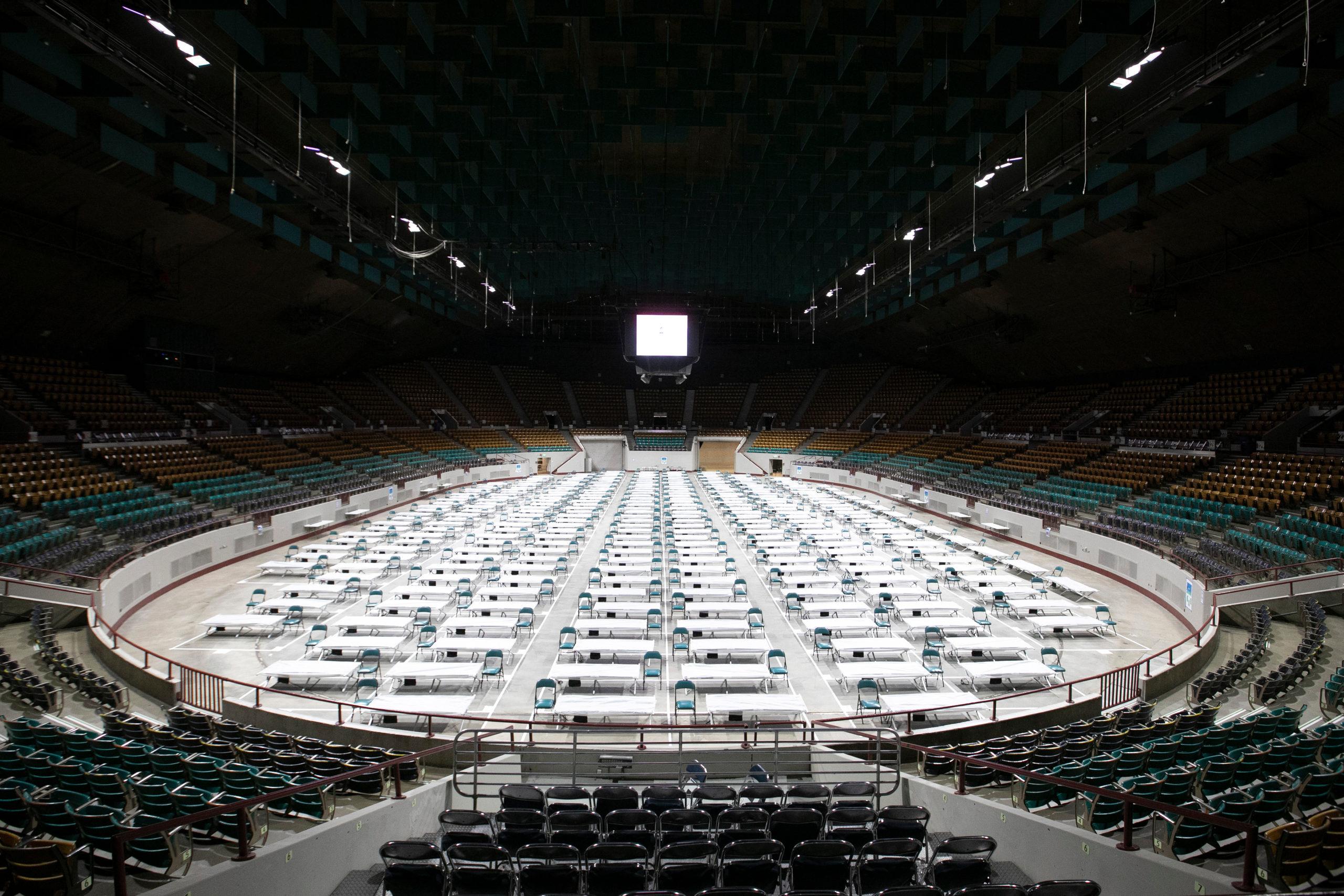Denver will sharply reduce the number of men and women who have been sheltered at the Coliseum and the nearby National Western Complex, even as it plans to erect tents in the Coliseum's parking lot to accommodate up to 60 people experiencing homelessness.
In outlining a series of shifts that will result in fewer people than the 1,000 or so who have sheltered at the Coliseum and the National Western in the Elyria-Swansea neighborhood, Chris Conner, homelessness resolution director with Denver's housing department, acknowledged stress has been placed on a part of town that is being asked to host the first city-sanctioned camp for people experiencing homelessness during the pandemic. Conner spoke Tuesday during an hour-long Zoom presentation about the sanctioned camp, which some in the area say they do not want as a neighbor. Conner was asked during the Zoom meeting whether the 24-hour shelters opened in April at the Coliseum and National Western have resulted in an impact on crime in the area.
"There certainly has (been), and that's part of our rationale for wanting to decompress that space and that campus a bit," Conner said. He said other reasons included the impending expiration of a contract for space at the National Western and a desire among service providers to return to something resembling the pre-pandemic norm in facilities they closed to allow them to focus staff and resources on the coronavirus-era shelters.
Conner said that starting Aug. 3 or 4, women and transgender individuals who have found shelter at the 300-bed Coliseum shelter will be going elsewhere, including to older shelters in the city. The Coliseum shelter had rarely reached its 300-bed capacity, while the National Western shelter was set up to accommodate 600 men and has consistently held 100 or so more. Emptying the city-owned Coliseum of women and transgender individuals will free it to host 300 men from the National Western. Men are are scheduled to move by Aug. 10 from the National Western to the Coliseum, older shelters and hotel rooms, Conner said.
"We are standing down the National Western" shelter, and the sanctioned camp is expected to be erected soon after, Conner said.
Conner said in an interview following Tuesday's Zoom session that City Council would have to approve placing the camp, envisioned to shelter up to 60 people, outside the Coliseum. Conner said more meetings with neighbors were planned to continue discussing the sanctioned camp, also known as a safe outdoor space, at the Coliseum.
"We're listening and we want to find a way forward if there is one," Conner said.
Hearing that the Coliseum and the National Western will be hosting fewer people did little to alleviate concerns among some neighbors about sanctioned camping.
Drew Dutcher, president of the Elyria and Swansea Neighborhood Association, listened to Tuesday's presentation, during which he and his neighbors were only able to make comments and pose questions by using the chat function. Dutcher said that if the camp lands in the Coliseum parking lot, it will be "despite really overwhelming community objection."
"All of these big powers are shaping our future and we don't have a say in it," Dutcher said in an interview after the meeting. "You know what they'll say? Is that, 'We listened to the community.'"
Gayle LeRoux was among the residents of Elyria-Swansea and neighboring Globeville who Zoomed into the meeting addressed by Conner, Danica Lee of the city's health department, and Cole Chandler and Cuica Montoya of the Colorado Village Collaborative. The nonprofit Colorado Village Collaborative is to manage the sanctioned camp where people will be given tents, meals and access to bathrooms and shower facilities and support such as pathways to jobs and permanent housing.
"Just putting people on that hot asphalt in tents, it's not OK," LeRoux said in an interview following the meeting. "Denver is a rich city. We have the resources to house people."
LeRoux's neighbor, Angela Garcia, said it was unfair that she and others might be seen as "hating the homeless" because they opposed placing a sanctioned camp on the Coliseum parking lot.
"I don't want anybody to be homeless," Garcia said in an interview. "I don't want anybody to be on the streets."
Garcia said that the struggling, largely minority neighborhoods of Globeville and Elyria-Swansea, which have been hard-hit by the coronavirus and its impact on the economy, have done their part to support people experiencing homelessness. Garcia said other areas of the city should step up, and questioned why millions of dollars have been spent on emergency solutions to homelessness instead of on affordable housing.
Chandler said during the Zoom meeting that the Coliseum parking lot had emerged as the top candidate for the first of three or four temporary sanctioned camp sites because it offered enough space, would cost little because it is owned by city, and was a third of a mile from residences. Chandler said sites being considered for future camps were not in Globeville or Elyria-Swansea, but did not say where they were. He said it was not clear when future camps would be erected.
LeRoux and Garcia were among those who had tried unsuccessfully to stop the Colorado Village Collaborative from moving a tiny home village (an alternative to shelters) to Globeville last year. Garcia said the village of 20 residents had drawn transients to the neighborhood and that fights have broken out among its residents. She said people experiencing homelessness harass Globeville and Elyria-Swansea residents going to a McDonald's that is one of the few places in the area to get food.
"If you go to the McDonald's now, you're hit up by the homeless to either give them money or buy drugs," Garcia said.
If the Colorado Village Collaborative "cannot manage 20 people, how are they going to manage 60?" she said.
Conner said he understood the anger and frustration expressed in comments during the Zoom meeting. Anger, Conner said, was an appropriate response to homelessness.












